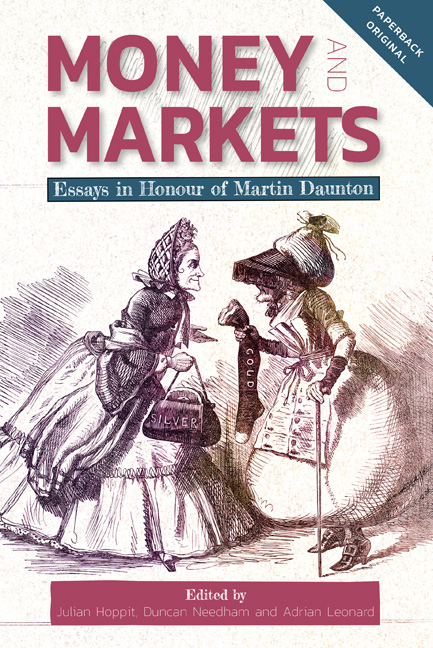Book contents
- Frontmatter
- Contents
- List of Figures
- List of Tables
- List of Contributors
- List of Abbreviations
- Introduction
- 1 Taxing London and the British Fiscal State, 1660–1815
- 2 Rents, Squalor, and the Land Question: Progress and Poverty
- 3 Marine Insurers, the City of London, and Financing the Napoleonic Wars
- 4 The Political Economy of Sir Robert Peel
- 5 Champagne Capitalism: France’s Adaptation to Britain’s Global Hegemony, 1830–80
- 6 The 1848 Revolution in Prussia: a Financial Interpretation
- 7 Imperial Germany, Great Britain and the Political Economy of the Gold Standard, 1867–1914
- 8 Knowledge, Contestation and Authority in the Eurodollar Market, 1959–64
- 9 Continuity and Change in British Conservative Taxation Policy, c. 1964–88
- 10 Britain Since the 1970s: a Transition to Neo-Liberalism?
- 11 Maplin: the Treasury and London’s Third Airport in the 1970s
- 12 Workfare and the Reinvention of the Social in America and Britain, c. 1965 to 1985
- 13 Charity and International Humanitarianism in Post-War Britain
- 14 Discounting Time
- 15 The Material Politics of Energy Disruption: Managing Shortages Amidst Rising Expectations, Britain 1930s–60s
- The Published Writings of Martin J. Daunton
- Index
- People, Markets, Goods: Economies and Societies in History ISSN: 2051-7467
2 - Rents, Squalor, and the Land Question: Progress and Poverty
Published online by Cambridge University Press: 13 April 2021
- Frontmatter
- Contents
- List of Figures
- List of Tables
- List of Contributors
- List of Abbreviations
- Introduction
- 1 Taxing London and the British Fiscal State, 1660–1815
- 2 Rents, Squalor, and the Land Question: Progress and Poverty
- 3 Marine Insurers, the City of London, and Financing the Napoleonic Wars
- 4 The Political Economy of Sir Robert Peel
- 5 Champagne Capitalism: France’s Adaptation to Britain’s Global Hegemony, 1830–80
- 6 The 1848 Revolution in Prussia: a Financial Interpretation
- 7 Imperial Germany, Great Britain and the Political Economy of the Gold Standard, 1867–1914
- 8 Knowledge, Contestation and Authority in the Eurodollar Market, 1959–64
- 9 Continuity and Change in British Conservative Taxation Policy, c. 1964–88
- 10 Britain Since the 1970s: a Transition to Neo-Liberalism?
- 11 Maplin: the Treasury and London’s Third Airport in the 1970s
- 12 Workfare and the Reinvention of the Social in America and Britain, c. 1965 to 1985
- 13 Charity and International Humanitarianism in Post-War Britain
- 14 Discounting Time
- 15 The Material Politics of Energy Disruption: Managing Shortages Amidst Rising Expectations, Britain 1930s–60s
- The Published Writings of Martin J. Daunton
- Index
- People, Markets, Goods: Economies and Societies in History ISSN: 2051-7467
Summary
Martin Daunton's contributions to urban history are immense. His earliest works, Coal metropolis: Cardiff 1870–1914 (1977) and House and home in the Victorian city: working class housing 1850–1914 (1983), were deeply researched, thoughtful, and influenced me greatly. In this chapter I return to these works, and forty years on still find his insights into the functioning of cities illuminating. This chapter contextualises Henry George's polarity of progress and poverty, also adopted by Martin in another work, and links land values and taxation, two further areas where Martin has made major contributions to urban and economic history. The chapter proceeds from an exploration of the nature and extent of landownership in terms of land prices, and shows that institutional users and major utility companies had important, and previously under-acknowledged, distorting effects on local property markets. Though reference is made to a number of English cities, distinctive Scottish data sources on urban landownership are used to explain the impact on rents and living conditions there. Thus, the pressure of urban development (progress) is at the cost of squalor accommodation (poverty) in Scotland.
The irresistible disorderly growth of great cities, which may be described in one word as conurbation, is almost as great a social evil as unemployment. It has involved in the past daily waste of life and human energy in needless travel, bad housing and ill health, needless exhausting toil for the housewife in struggling with dirt and discomfort, habituation of the population to hideous surroundings.
It seems that the taxation of land, like the poor, is always with us. From time to time the topic gains political traction, then falters. Rather than focusing on the ownership of land itself, property taxation in Britain has concentrated largely on taxing the combined value of land and buildings. Driven by a sense of social justice, more radical proposals intended to cream off the increment in rising house property prices have come to nought. Such an approach, a ‘single tax’ to deal with these ‘betterment’ issues, as promoted by the American political economist and social philosopher Henry George in Progress and poverty (1879), were embraced by the Liberal Party as part of land reform in the late nineteenth century. They have since found little resonance in Britain.
- Type
- Chapter
- Information
- Money and MarketsEssays in Honour of Martin Daunton, pp. 35 - 54Publisher: Boydell & BrewerPrint publication year: 2019

